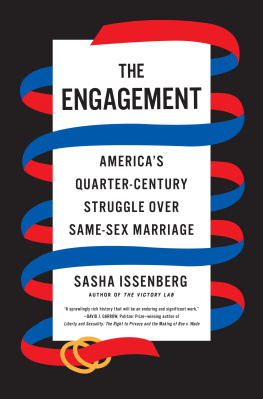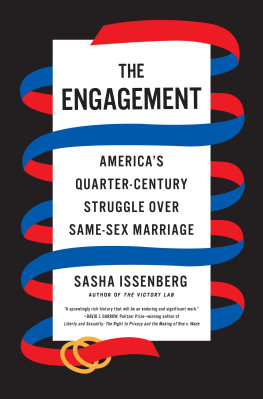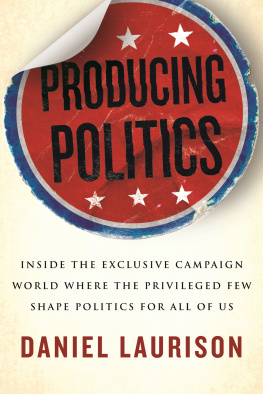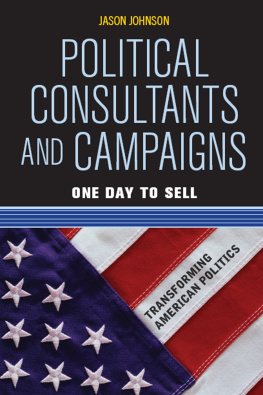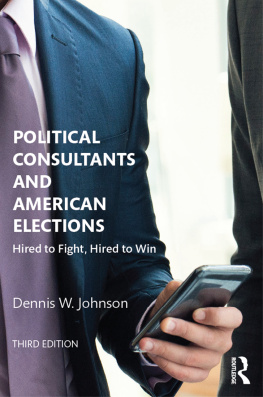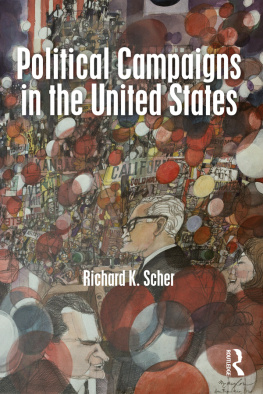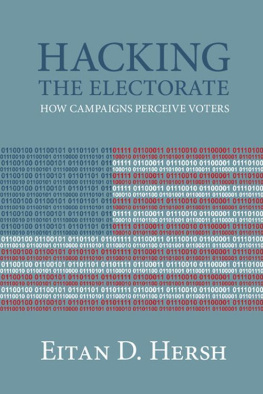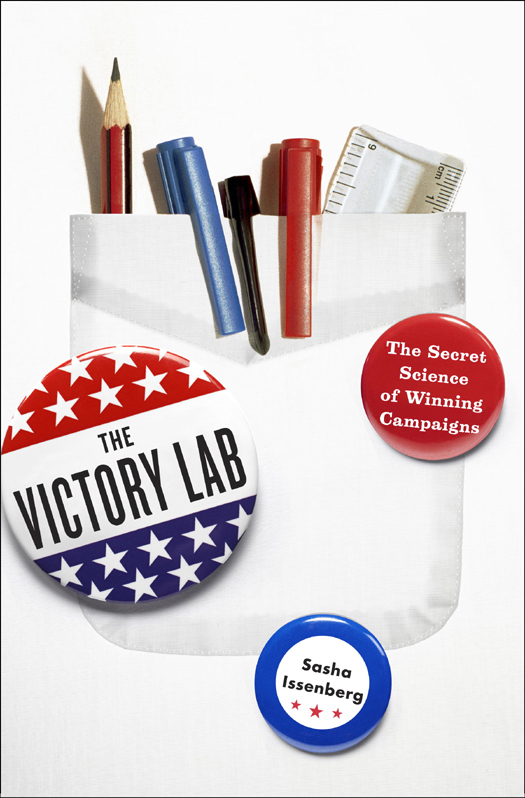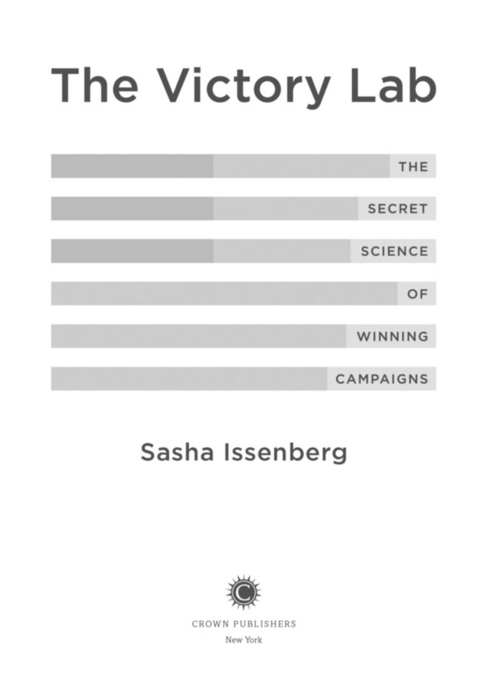ALSO BY SASHA ISSENBERG
The Sushi Economy
Copyright 2012 by Sasha Issenberg
All rights reserved.
Published in the United States by Crown Publishers,
an imprint of the Crown Publishing Group,
a division of Random House, Inc., New York.
www.crownpublishing.com
CROWN and the Crown colophon are registered trademarks of Random House, Inc.
Library of Congress Cataloging-in-Publication Data
Issenberg, Sasha.
The victory lab: the secret science of winning campaigns/Sasha Issenberg.
p. cm.
1. Internet in political campaignsUnited States. 2. Political campaignsUnited States. 3. Political campaignsTechnological innovationsUnited States. 4. Political campaignsUnited StatesPsychological aspects. I. Title.
JK2281.I77 2012
324.70973dc23
2012023774
eISBN: 978-0-307-95481-7
Jacket design by Christopher Brand
Jacket photographs: (shirt pocket) Plush Studios;
(pens and pencils) Michael Wildsmith;
(button with title) Peter Dazeley; (other buttons) Fuse
v3.1
To my parents,
Bella Brodzki and Henry Issenberg,
for everything
Contents

HOW TO WIN AN ELECTION
WITHOUT ANYONE KNOWING
T he ads aired by the two candidates in the 2010 Colorado U.S. Senate race told the story of the ideological war that defined that midterm election. Michael Bennet, a freshman Democrat appointed to replace a man who had become one of Barack Obamas cabinet secretaries, was deeply in hock to a liberal White House. Tea Party Republican challenger Ken Buck wasor so went the punditry and Bennets attackstoo conservative for the moderate, suburbanizing state.
Meanwhile, one million letters being delivered to Democratic-leaning Coloradoans in the last days of the race made no mention of either candidate, their allegiances, or the issues that separated them. They lacked any allusion to the ideological split riving the nation or reference to the policy consequences of a change in party control of the Senate. The folded pieces of laser-printed white paper were designed to be ugly, with a return address referring to a sender whose name voters were unlikely to recognize. The sender thanked the recipient by first name for having voted in 2008, and then said she looked forward to being able to express such gratitude again after the coming elections. The letter, dispassionate in tone and startlingly personal in content, might have inspired most recipients to dispatch it to a trash can with no strong feeling other than being oddly unsettled by its arrival.
It was not only in Colorado where communications in the last days before the 2010 elections seemed out of whack with such a feral season in American politics. Across the country on the Sunday night before the election, millions of Democrats received an e-mail from Obamas seemingly dormant campaign apparatus, Organizing for America, with a gently worded reminder that they had made a commitment to vote in this election and that the time has come to make good on that commitment. Think about when youll cast your vote and how youll get there.
The voters who received either the Colorado letter or the Organizing for America message had likely never encountered anything like them before. At a moment when many candidates, admen, pundits, and organizers thought that the way to get their allies to the polls was to implore them through television ads to consider the elections high stakes and respond in kind, these tactics, designed to go undetected by media coverage, aimed to push buttons that many voters didnt even know they had. The people who had scripted the messages and carefully selected their recipients aimed to exploit eternal human vulnerabilitiessuch as the desire to fit in or not to be seen as a liarin order to turn layabouts into voters.
The man who had sent the million letters in white envelopes did the quick math after the Colorado election from his post thousands of miles away. Hal Malchow was a middle-aged Mississippian who had spent his life conniving new ways to win elections, except for a brief detour into securities law that ended when he realized that writing the contracts to guard against complex financial schemes was less fun than trying to hatch them. Now he was playing a different angle, and calculated that the psychological influence he had exerted through his letters would improve turnout among recipients by 2.5 percent. That would mean that his language had created 25,000 new voters, most of them carefully selected to be likely votes for the incumbent. Bennet had lagged Buck for much of the year and had never approached the 50 percent threshold that many experts say is necessary in pre-election polls for an incumbent to expect victory. There was further evidence of a gap in partisan enthusiasms: at the time the polls opened, 74,000 fewer Democrats had returned their early-vote ballots than Republicans. But on election day, something was pushing Bennet even with Buck, and by the time Malchow turned in for the night the two candidates were separated by only hundreds of votes.
The next morning, he awoke to good news from the west. Bennet had pulled ahead of Buck, and was on his way to winning the race by 15,000 votes. His victory would help to keep the Senate in Democratic control. Malchow was having fun.
COLORADO WAS ONE of the rare sources of cheer for Democrats in an otherwise disastrous set of midterm elections in 2010. Party wise men were eager to mine grand lessons from the Rockies; if only they could figure out what made Colorado resist a national conservative wave, they could use Bennets strategy as a model for Obamas reelection two years later. The Bennet thing was pretty instructive, Obamas chief strategist, David Axelrod, told the National Journal in a postmortem. The contrast he drew with Buck was very meaningful.
The people who explain politics for a livingthe politicians themselves, their advisers, the media who cover themlove to reach tidy conclusions like this one. Elections are decided by charismatic personalities, strategic maneuvers, the power of rhetoric, the zeitgeist of the political moment. The explainers cloak themselves in loose-fitting theories because they offer a narrative comfort, unlike the more honest acknowledgment that elections hinge on the motivations of millions of individual human beings and their messy, illogical, often unknowable psychologies. In fact, Bennet could have won the Senate seat because of major demographic changes and ideological fault lines around delicate cultural issues, or because of a single letter that exerted a subtle dose of peer pressure on its recipientsor hundreds of other factors big and small that played a part in changing peoples minds or getting them to vote.
The political craft thrives on that ambiguity. It allows just about anyone involved to take credit for good results or attribute blame for poor ones, confident of never being proven wrong. After a positive result on election night, everything a winning campaign did looks brilliant. When a campaign loses, consultants usually blame the candidate or the momentand there rarely seem to be professional consequences for those who had set the strategy or tactics. Longevity, as well as the aura of wisdom that comes from it, is a political operatives most valued trait.


